Introduction
The integration of AI tools in software development is revolutionizing the industry, offering unprecedented opportunities for enhancing efficiency and productivity. From automating repetitive tasks to providing intelligent code suggestions, these tools enable developers to focus on complex challenges and innovative solutions. With AI-powered tools like Tabnine, GitHub Copilot, Cody AI, Mintlify, Snyk, WhatTheDiff, and Galileo AI, developers can streamline their workflows, reduce errors, and produce higher-quality code faster.
This article delves into the benefits and functionalities of these cutting-edge tools, illustrating how they are transforming the development landscape and reshaping the roles of engineers across various sectors.
Benefits of Using AI Tools in Development
AI resources are transforming the software development environment by automating repetitive tasks and enabling developers to concentrate on more intricate challenges. Research has demonstrated that teams utilizing AI-driven resources, such as natural language program generation, automated testing, and intelligent completion, finish their tasks approximately 30% quicker than those employing conventional resources. This significant boost in productivity is attributed to the reduction in human error and the provision of real-time suggestions and corrections, which enhance the quality of programming. The integration of these AI tools not only streamlines coding processes but also has broader implications for the engineering field, potentially reshaping the roles and responsibilities of engineers and leading to major efficiency gains and cost savings across various industries.
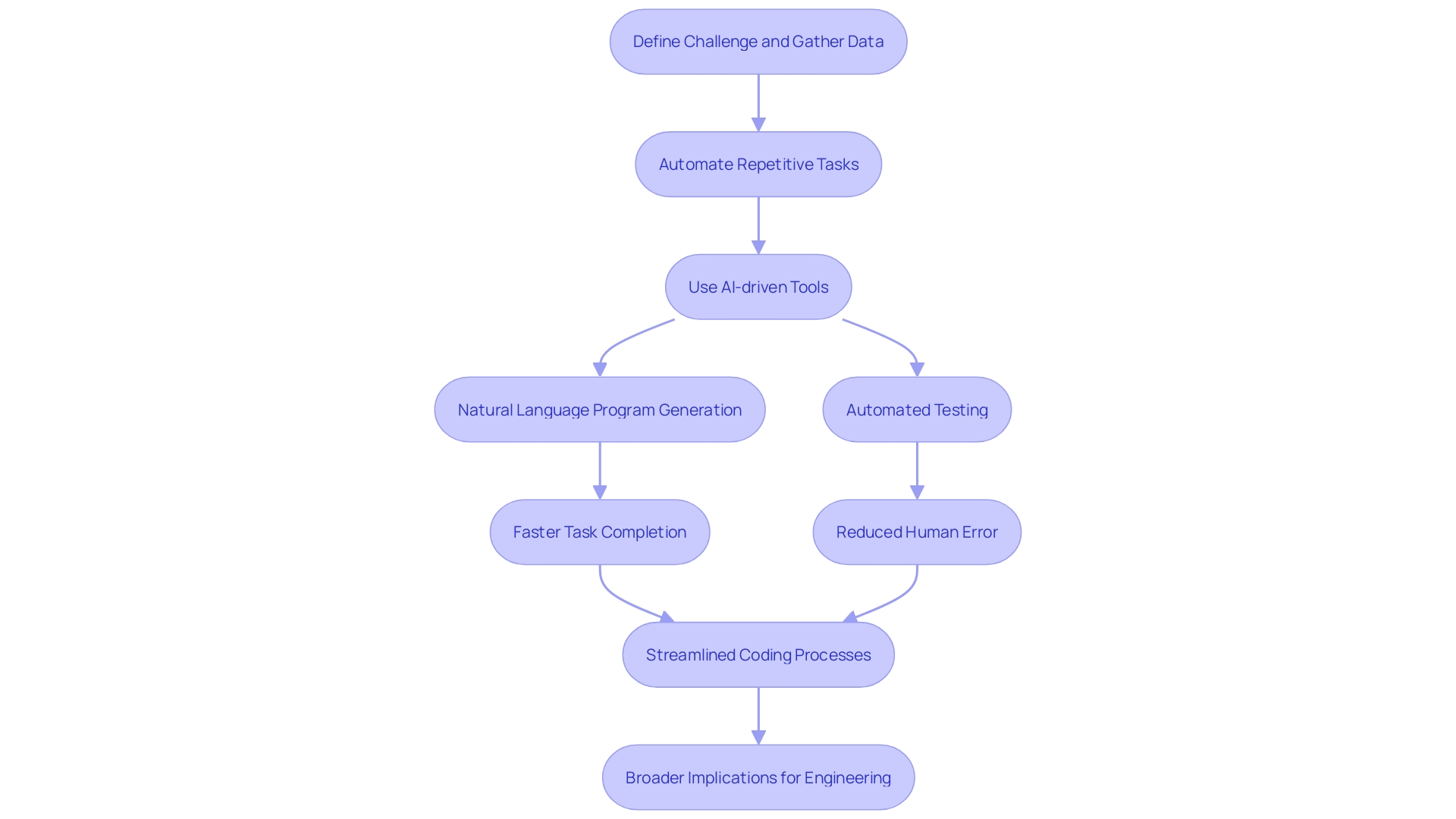
Tabnine: AI-Powered Code Completion Tool
Tabnine utilizes advanced machine learning to provide intelligent completions that align with your existing programming patterns and codebase. Supporting a wide array of programming languages, Tabnine integrates smoothly with popular IDEs, significantly enhancing your coding efficiency through highly relevant suggestions. Uniquely, Tabnine respects your privacy by not training on your programming unless you explicitly choose to connect your codebase. This guarantees that your proprietary software stays protected while you gain from AI-driven insights. A study by tidelift.com reveals that developers dedicate 22% of their time to repetitive tasks, which Tabnine can help alleviate by automating suggestions customized to your project's specific requirements. This method not only speeds up advancement but also enhances software quality by reducing mistakes. Generative AI applications such as Tabnine are fundamentally transforming the software development lifecycle, making it more streamlined and efficient.
GitHub Copilot: AI-Powered Code Completion and Prediction Tool
GitHub Copilot functions as an AI-driven coding assistant, offering recommendations for complete lines or sections of programming as you type. Utilizing a large collection of public programming resources, it transforms into an essential resource for developers seeking to accelerate their workflow and reduce repetitive programming activities. Its capability to generate code snippets using a large language model (LLM) significantly enhances productivity.
A study conducted with Accenture revealed that over 80% of participants successfully adopted GitHub Copilot, with an impressive 96% success rate among initial users. Furthermore, 67% of participants employed the resource at least five days each week, averaging 3.4 days of usage weekly. These statistics highlight the tool's simplicity and its significant effect on programmer efficiency.
Incorporating GitHub Copilot into the development process not only accelerates coding but also improves the quality of the code produced. By providing real-time recommendations and lowering cognitive burden, programmers can concentrate on more intricate assignments, improving their overall efficiency and contentment. This instrument is particularly advantageous for novice programmers, who see considerable improvements in acquiring knowledge and finishing tasks.
As AI keeps advancing, resources such as GitHub Copilot are poised to become increasingly essential to the software development lifecycle, simplifying activities from initial programming to upkeep and further.
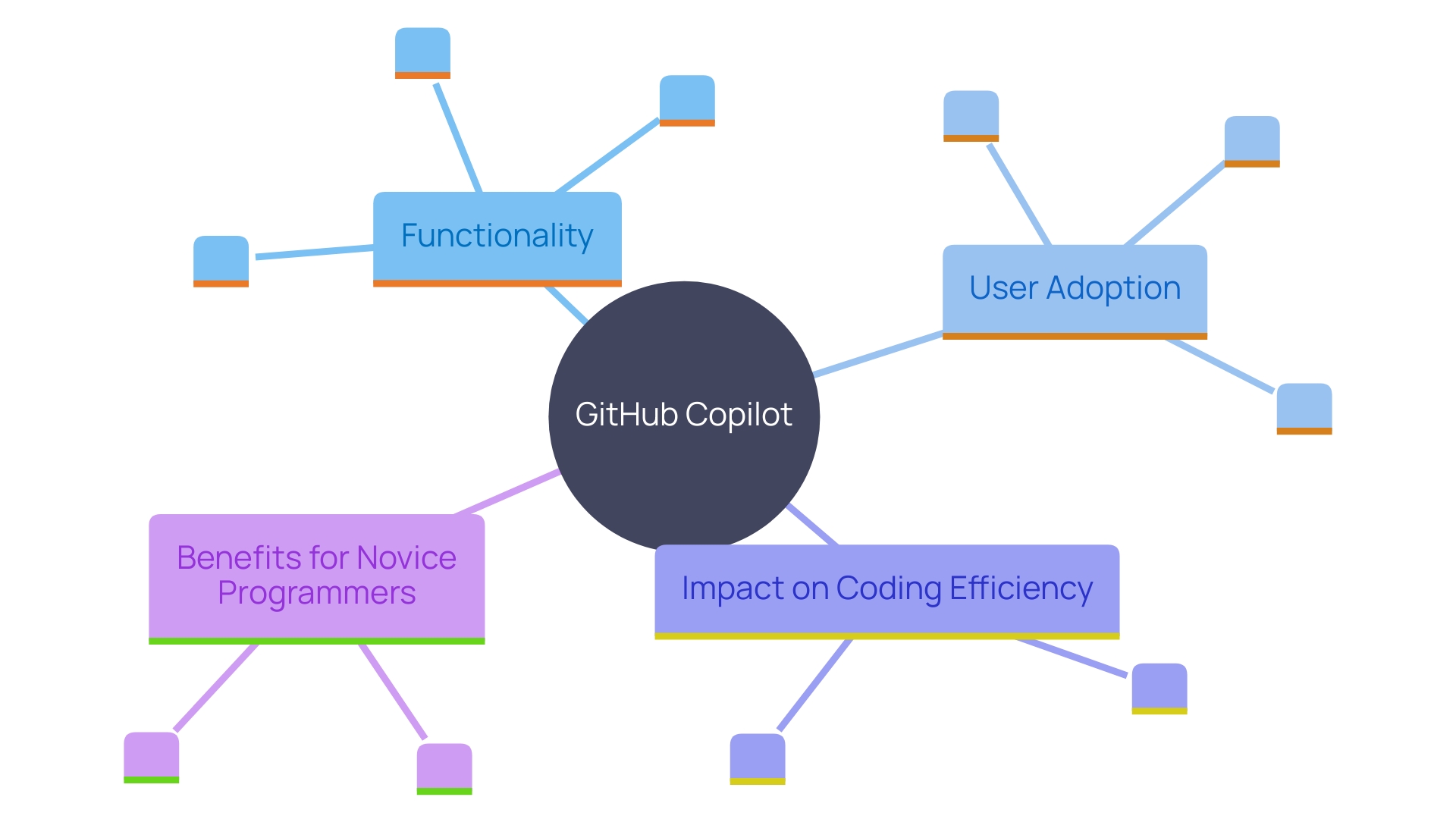
Cody AI: Advanced Code Assistant
Cody AI transforms how programmers handle coding by offering tailored and engaging support. This AI-driven tool not only assists programmers in comprehending complex code snippets but also provides detailed explanations for various coding concepts, transforming the learning process into an engaging experience. Cody's ability to manage routine coding tasks enables programmers to concentrate on more intricate and imaginative elements of their projects.
For junior developers or those new to a project, Cody is invaluable. It clarifies programming structures, design choices, and implementation specifics, making it easier to understand new concepts rapidly. As Idan Gazit from GitHub points out, tools like Cody lower the barrier to entry for programming, enabling more people to contribute to software creation. Imagine if everyone who picked up a guitar could play a basic tune immediately—there would be an explosion of new music. Similarly, Cody makes programming accessible, fostering an expansion in who can contribute to the tech industry.
Moreover, Cody's contextual search goes beyond simple keyword searches by understanding the context of your programming. It can identify pertinent snippets, functions, or classes based on their connections and usage within your project, thus simplifying the development process. This feature, combined with Cody's code completion capabilities, assists programmers in writing code more quickly and with fewer mistakes, significantly enhancing productivity.
The impact of integrating AI assistants like Cody into the workflow is profound. As one programmer observed, tasks like roadmap planning that would usually require significantly more time can be finished in a small portion of the duration. This substantial productivity increase not only improves individual performance but also speeds up project timelines, making Cody a vital resource for both novices and experienced programmers aiming to optimize their coding processes.
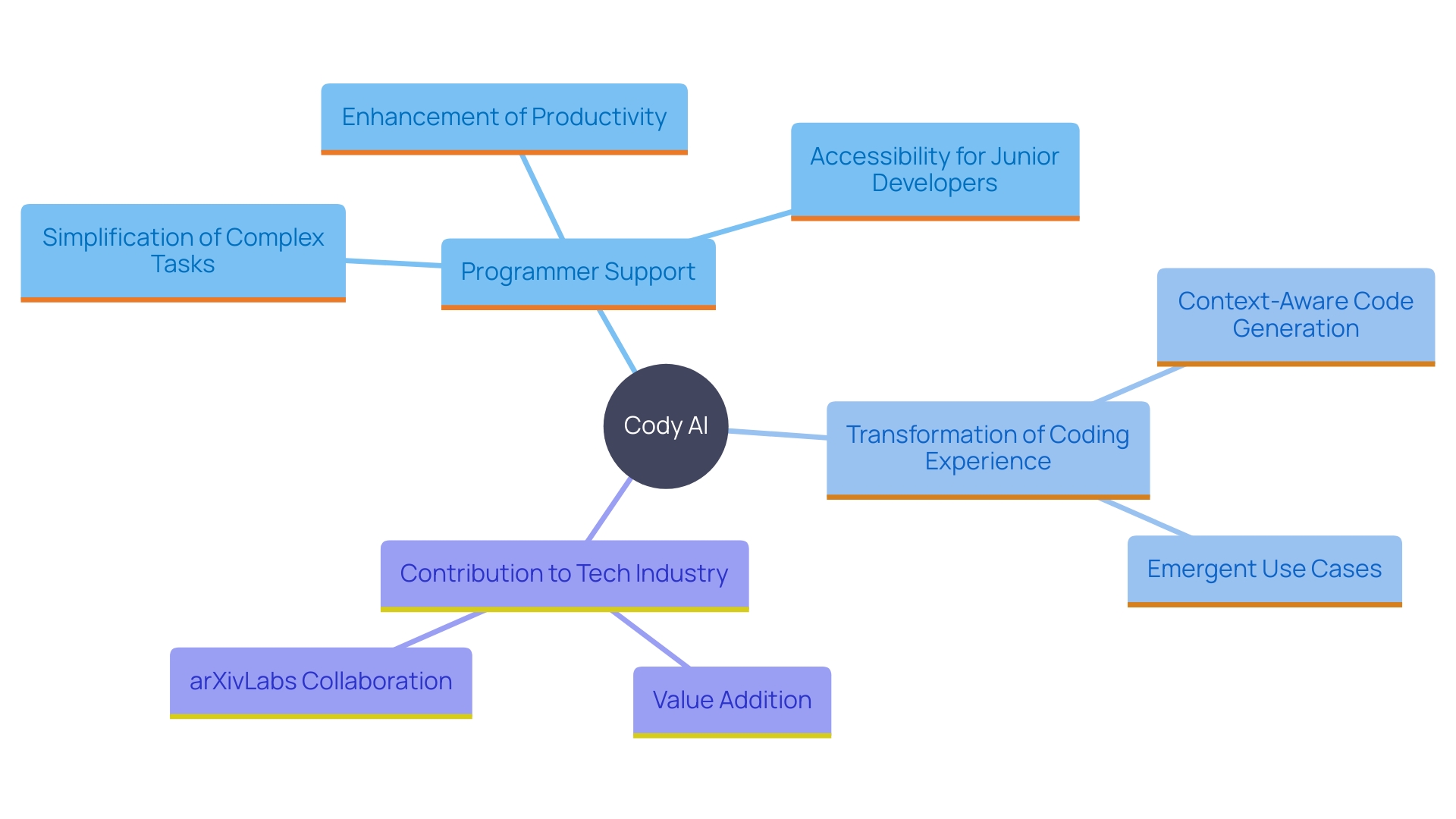
Mintlify: AI-Powered Code Documentation Tool
Mintlify automates the documentation process by generating clear and concise documentation from your programming, significantly enhancing productivity. It handles the repetitive and tedious tasks, allowing developers to focus on high-level design and problem-solving. Documentation can be generated in over 50 languages, ensuring inclusivity and accessibility for global teams. This automation not only saves time but also maintains a single source of truth across the project, crucial for team alignment and successful project outcomes. By leveraging AI-driven processes, Mintlify ensures that documentation is consistent in style and terminology, keeps pace with software updates, and expands without starting from scratch each time. This intelligent approach to documentation supports the creation of well-structured and maintainable programming, ultimately reducing the chances of errors and bugs.
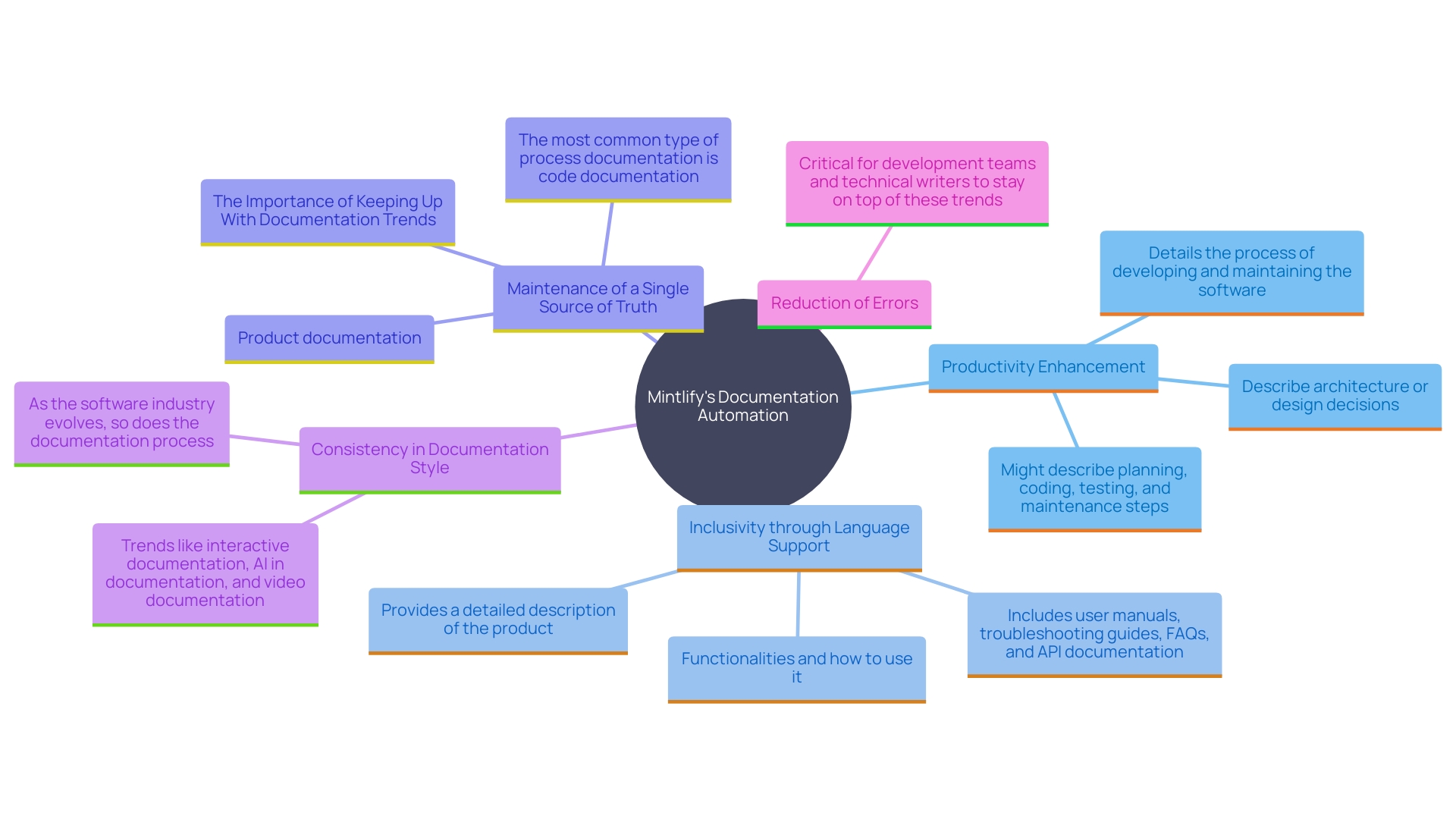
Snyk: Bug Detection and Code Analysis Tool
Snyk excels in pinpointing vulnerabilities in both your code and its dependencies. By seamlessly integrating into your CI/CD pipeline, Snyk delivers real-time alerts and fixes, ensuring that your applications remain secure and compliant with industry standards. The instrument is created to be swift and precise, generating fewer false alarms, which simplifies the process for programmers to resolve problems efficiently.
Snyk supports a wide array of programming languages and integrates with popular coding tools such as Visual Studio Code, GitHub, and GitLab. This enables developers to identify and fix vulnerabilities during the development process without leaving their existing workflows. For instance, Snyk's IDE extensions highlight vulnerabilities directly in your code editor, providing detailed information on each issue and how it can be resolved.
One notable feature is Snyk's ability to offer automated fixes. The tool can open pull requests with the necessary changes to update vulnerable dependencies, further streamlining the remediation process. Additionally, Snyk continuously monitors your projects for new vulnerabilities, ensuring ongoing security.
In real-world applications, such as a conference scheduling app used in workshops, Snyk has demonstrated its effectiveness in identifying and fixing vulnerabilities like Cross-site Scripting (XSS). By showing the exact location of the vulnerability and offering a diff that highlights how similar issues were resolved in open-source projects, Snyk provides actionable insights that developers can quickly implement. 'This capability is further enhanced by the integration of Code and AI-driven programming suggestions, which offer potential fixes and natural language explanations for identified issues.'.
Overall, Snyk's comprehensive approach to security in programming, combined with its developer-friendly features, makes it an invaluable tool for modern development teams striving to maintain secure and compliant applications.
WhatTheDiff: Code Review Optimizer
WhatTheDiff transforms the review process by emphasizing changes and proposing enhancements, thus greatly minimizing the time and effort needed for conventional evaluations. Leveraging advanced AI and natural language processing, it understands and interprets developer comments, automatically identifying potential issues and offering solutions. This intelligent tool not only highlights changes but also streamlines understanding, making comparison of programming more efficient and intuitive. The asynchronous nature of evaluations means that reviewers can examine work at their convenience, allowing for a thorough analysis without the pressure of real-time feedback. This approach ensures that the final product is of high quality, well-structured, and adheres to coding standards. By focusing on the completed code and its integration within the larger codebase, WhatTheDiff enhances collaboration and ensures a cohesive, maintainable software architecture.
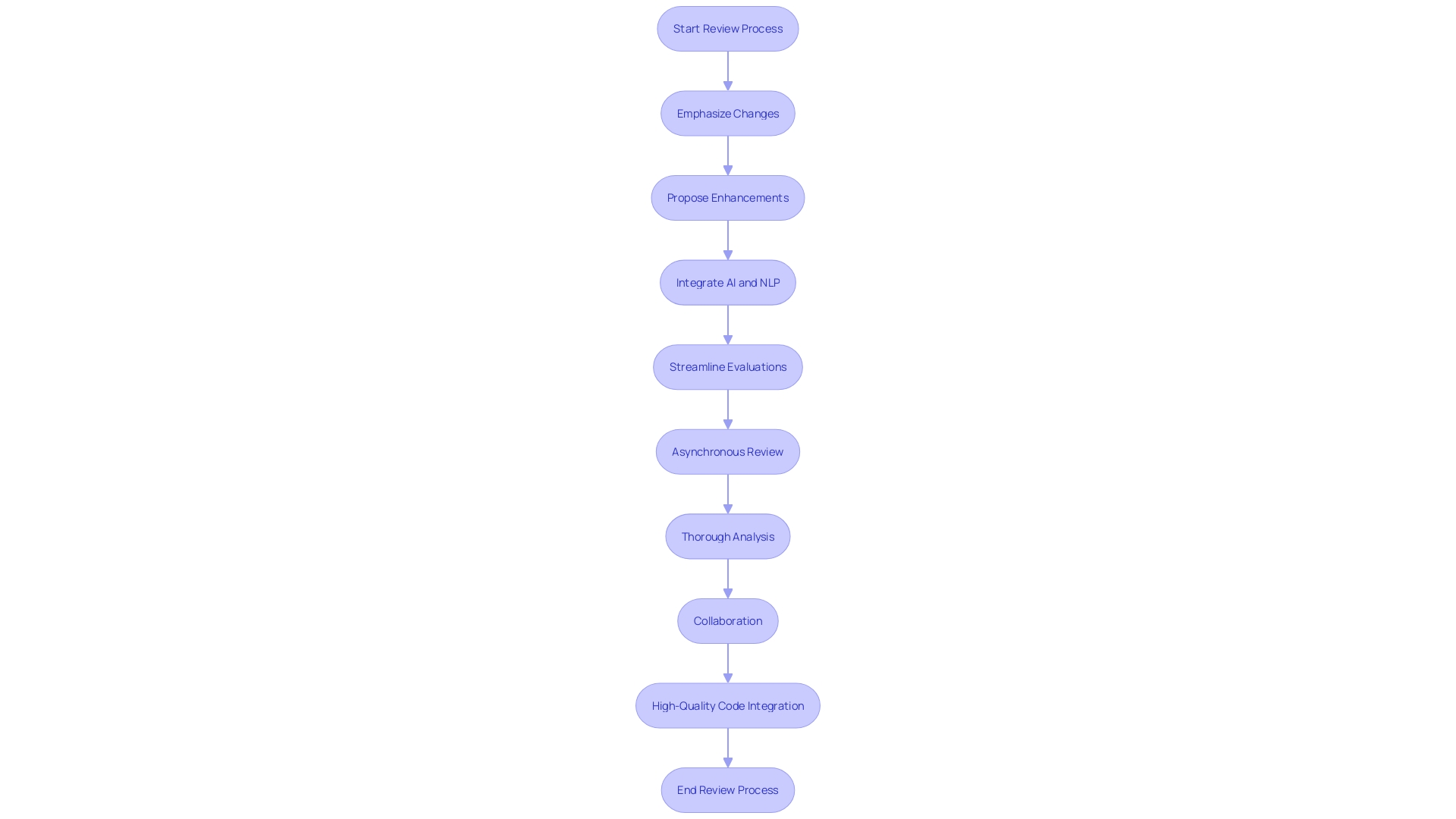
Galileo AI: AI-Powered Web Development Tool
Galileo AI transforms the creation of web applications by speeding up the coding process and providing valuable design suggestions. This AI-driven application improves both front-end and back-end processes, allowing creators to concentrate on more strategic activities. Based on recent industry findings, AI tools such as Galileo AI can enhance productivity among programmers by an average of 30%. This efficiency improvement is apparent in practical applications, such as Intuit's use of generative AI to standardize programming and documentation, which has greatly simplified their creation process. Furthermore, Ai's capacity to automate routine tasks and provide predictive analytics not only improves workflow but also enhances the overall user experience. As AI continues to integrate into creation workflows, it transforms the way websites are designed, built, and maintained, making it an indispensable asset for modern developers.
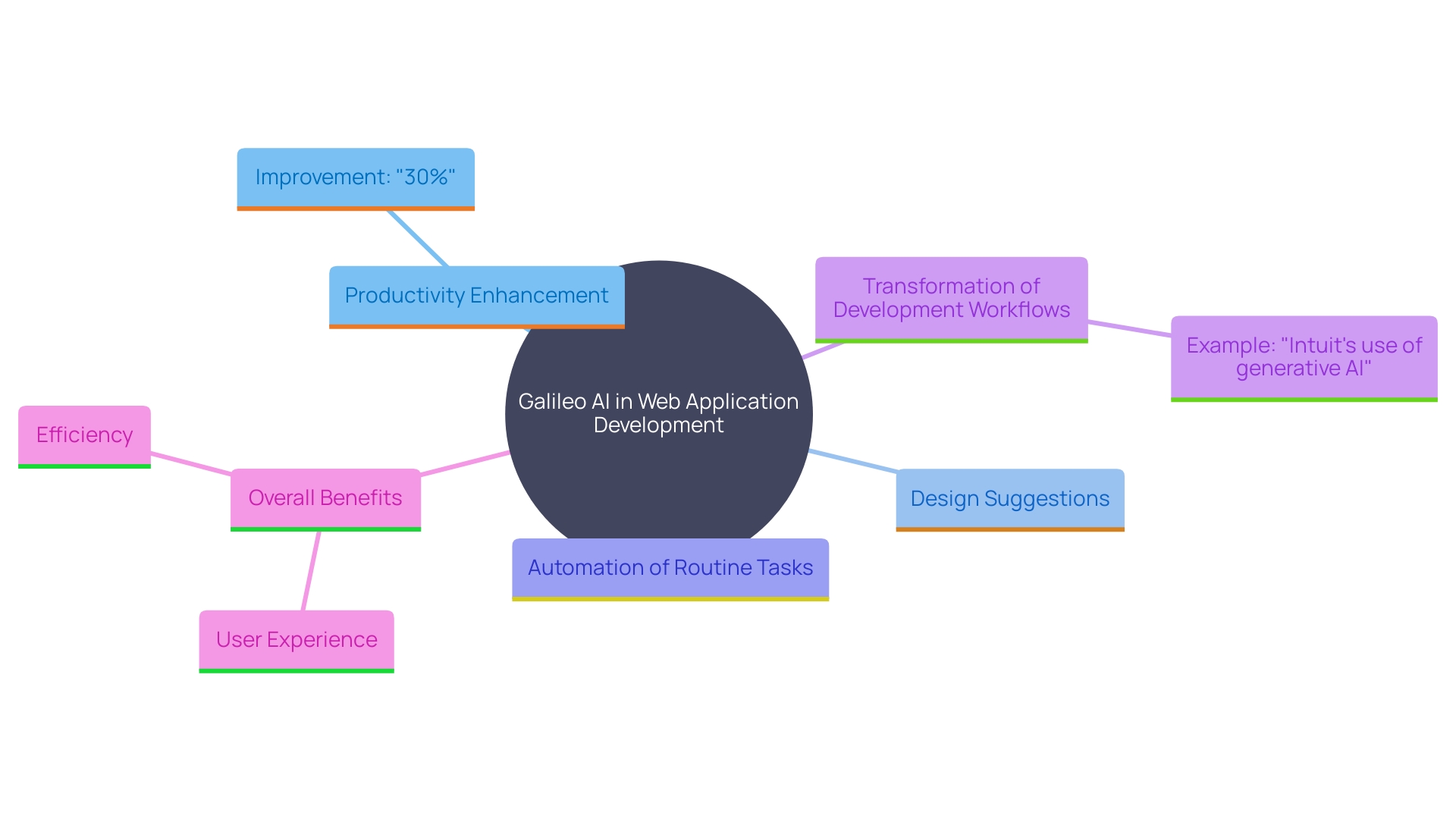
Free AI Tools for Developers to Consider
Investigating a range of complimentary AI resources can greatly improve various facets of software development, from code optimization and debugging to project management. For instance, resources like Claude offer context-aware suggestions and can identify potential issues tailored to your project's architecture. This feature alone has turned Claude into a virtual CTO for many developers, drastically improving project oversight and decision-making processes.
Additionally, research has demonstrated that groups employing AI-driven resources, such as natural language program generation and automated testing, finish tasks approximately 30% quicker on average compared to those utilizing conventional methods. This boost in productivity not only accelerates development cycles but also leads to substantial cost savings.
Furthermore, adaptable resources such as DataRobot and GPT-3 provide user-friendly interfaces that don't necessitate extensive data science backgrounds, making them reachable for a broad range of applications, including model monitoring and code generation. These tools are reshaping how developers work, enabling them to focus more on strategic tasks and less on mundane coding activities, thereby driving efficiency and innovation in the tech industry.
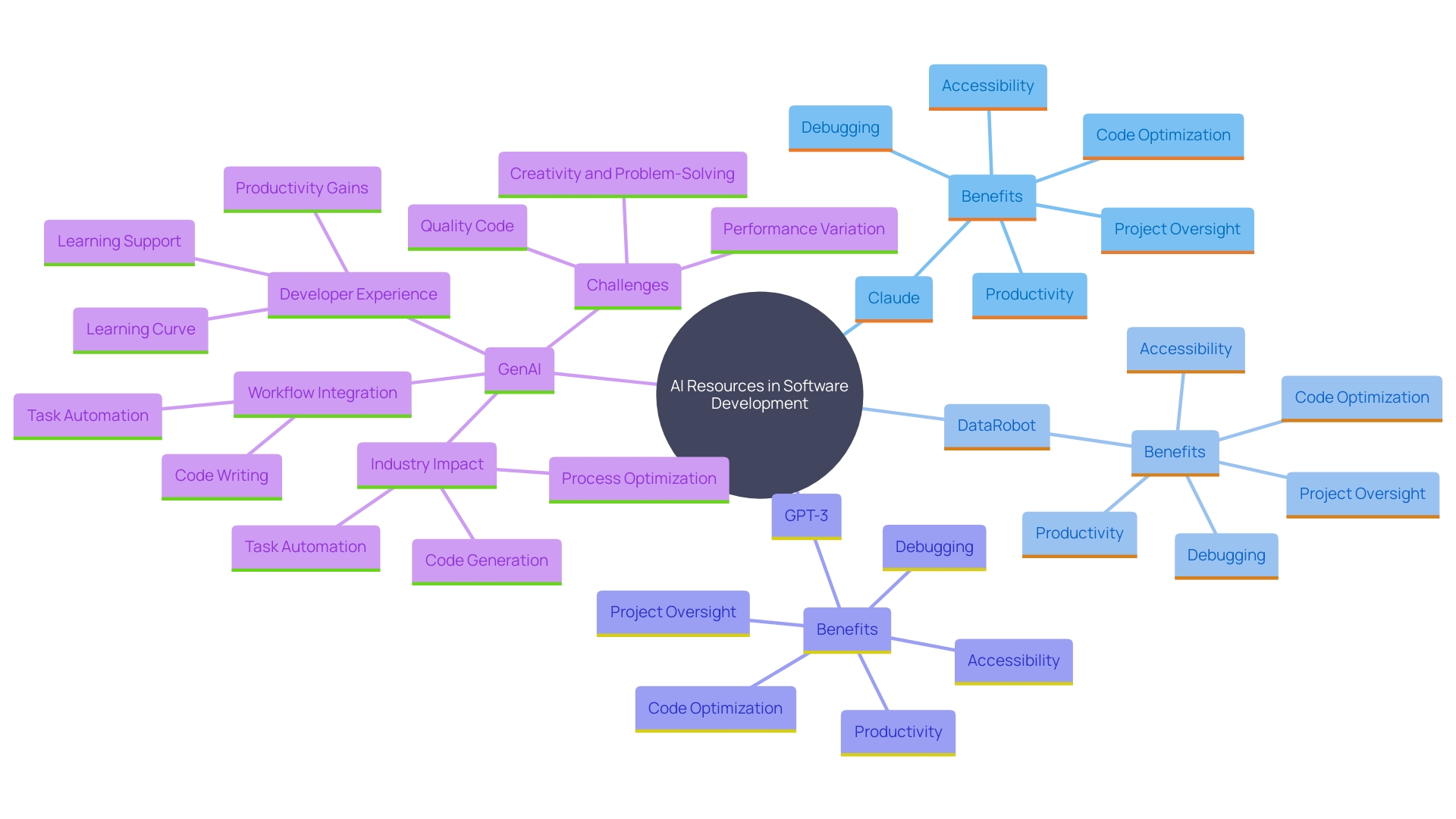
Conclusion
The integration of AI tools into software development is proving to be a game-changer, significantly enhancing productivity and efficiency across the industry. By automating repetitive tasks and providing intelligent code suggestions, developers can allocate their time to more complex challenges and innovative solutions. Tools like Tabnine and GitHub Copilot exemplify how AI can streamline coding processes, reduce human error, and improve code quality—leading to faster project completion and a more satisfying work experience.
Moreover, advanced tools such as Cody AI and Mintlify further enhance the development lifecycle by facilitating learning and automating documentation. These capabilities not only lower barriers for entry-level developers but also ensure that teams maintain a consistent and comprehensive documentation process. The ability to quickly grasp new concepts and maintain project alignment is vital in today’s fast-paced development environment.
Security and code quality are also paramount, with tools like Snyk and WhatTheDiff addressing vulnerabilities and optimizing the review process. By integrating these AI solutions into the development workflow, teams can ensure that their applications are secure and maintain high coding standards, ultimately resulting in a more robust and reliable software product.
As the capabilities of AI tools continue to evolve, their role in software development will only become more integral. Embracing these innovative solutions not only enhances individual and team performance but also transforms the overall landscape of software engineering, paving the way for a future where efficiency and productivity are maximized.
Frequently Asked Questions
How are AI resources changing the software development environment?
AI resources are transforming software development by automating repetitive tasks, allowing developers to focus on more complex challenges. Research shows that teams using AI-driven tools complete tasks approximately 30% faster than those using traditional methods.
What are some examples of AI-driven resources mentioned in the article?
Some examples include: Tabnine, GitHub Copilot, Cody AI, Mintlify, Snyk, WhatTheDiff, and Galileo AI.
How does Tabnine enhance coding efficiency?
Tabnine utilizes advanced machine learning to provide relevant suggestions aligned with a developer's coding patterns. It respects user privacy by not training on their code unless they opt in, helping to automate repetitive tasks and reduce errors.
What benefits does GitHub Copilot provide to developers?
GitHub Copilot acts as an AI coding assistant that suggests lines or sections of code, thereby accelerating workflow and reducing repetitive tasks. It has shown a significant positive impact on programmer efficiency and is especially beneficial for novice programmers.
In what ways does Cody AI support programmers?
Cody AI provides tailored support by explaining complex code snippets and programming concepts, thus helping junior developers understand new ideas quickly. It also offers contextual search capabilities, enhancing productivity by simplifying code writing.
How does Mintlify improve the documentation process?
Mintlify automates the generation of documentation from coding, significantly reducing the time spent on tedious tasks. It ensures consistent documentation across projects and keeps pace with software updates.
What is the role of Snyk in ensuring code security?
Snyk identifies vulnerabilities in code and its dependencies by integrating into the CI/CD pipeline. It provides real-time alerts, automated fixes, and continuous monitoring to maintain application security.
How does WhatTheDiff transform the code review process?
WhatTheDiff simplifies the review process by highlighting changes and suggesting enhancements, which reduces the effort required for evaluations and improves the quality of the final product.
What is the impact of using AI tools like Galileo AI in web application development?
Galileo AI speeds up the coding process and provides valuable design suggestions, resulting in an average productivity enhancement of 30%. It automates routine tasks and aids in workflow optimization.
What are the broader implications of integrating AI resources in software development?
The integration of AI tools is reshaping the roles and responsibilities of engineers, leading to major efficiency gains, cost savings, and an overall transformation in how software is developed and maintained across various industries.




